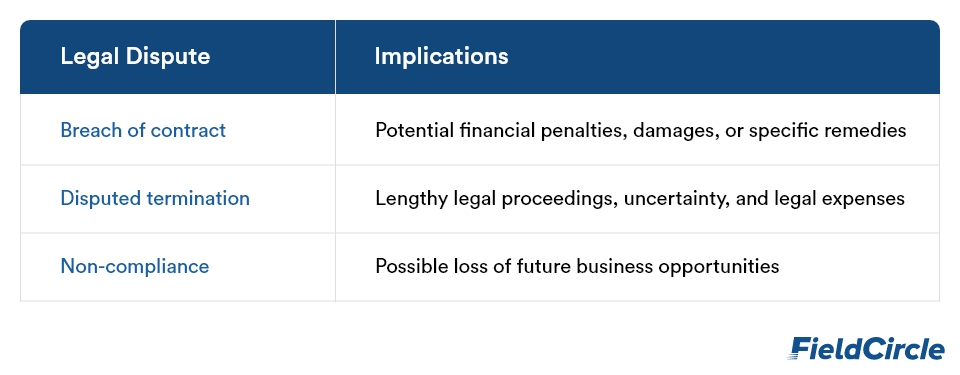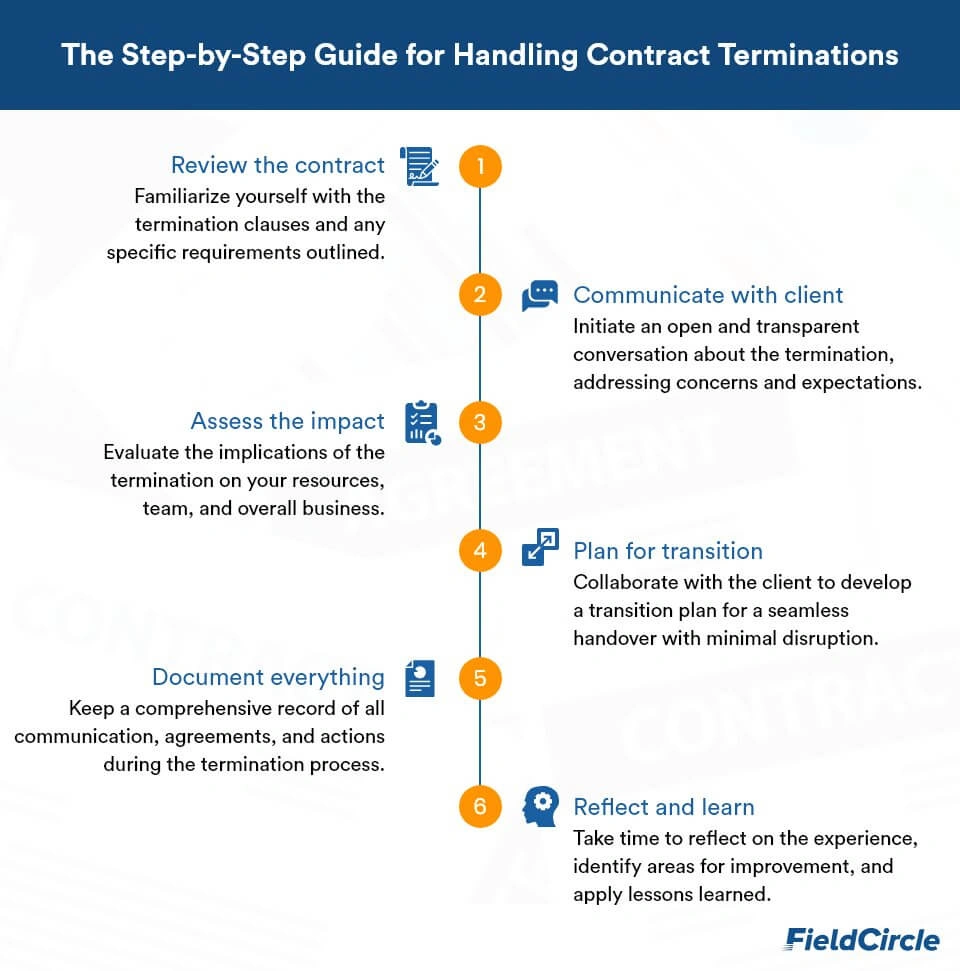Managing Contract Termination in Field Service

Have you ever experienced a difficult breakup? The kind that leaves you second-guessing every step, fraught with confusion and distress? Imagine facing a similar scenario, not in your personal life, but in your professional one. This is often the case when it comes to contract termination in field service – an area that, though significant, is often overlooked.
Just like a well-navigated breakup can preserve friendships and maintain dignity, managing contract terminations effectively can uphold business relationships, protect reputation, and prevent financial losses. This article delves into the complexities of contract termination in field service, highlighting common challenges and their impacts and providing solutions to ensure a smooth termination process.
Common Challenges in Contract Termination
Service providers often face various challenges that make the process complex and stressful. Let’s delve into this challenge and explore its consequences, along with a real-life example highlighting the importance of well-defined termination clauses.
Lack of clarity in contract terms and termination clauses
One of the significant challenges in contract cancellations arises from a need for more clarity in contract terms and termination clauses. When contract language is clear and clear, it becomes easier to determine the rights and responsibilities of both parties when ending the agreement. Let’s look at the consequences of poorly defined termination clauses:
Poorly defined termination clauses can lead to disputes and misunderstandings. For example, if a contract does not clearly state the notice period required for termination, one party may feel blindsided or unfairly treated. This can result in damaged relationships and potential legal consequences.
The case study provided by Gannons Solicitors can serve as an example of the consequences of poorly defined termination clauses in contracts. In this case, the distributor attempted to terminate the agreement prematurely, citing immediate effect. However, in the context of the information provided, distributors are considered clients of the service provider.
However, due to the lack of clarity in the termination clause and the requirement for written notice, Gannons Solicitors successfully argued that the termination could have been more effective. This demonstrates the importance of clearly defining termination clauses to avoid confusion and protect the parties’ rights.
Communication breakdown between service providers and clients
Another common challenge in contract cancellations is a breakdown in communication between service providers and clients. Effective and transparent communication is vital during contract termination, as it helps manage expectations, address concerns, and reach mutually agreeable solutions. Here is how miscommunication can impact adversely.
Miscommunication can lead to misunderstandings, frustrations, and escalations. For instance, if a service provider needs to communicate the reasons for contract cancellations to the client clearly, it can leave the client feeling dissatisfied and confused. This can damage the client’s trust in the service provider and make future collaborations challenging.
Let’s consider a scenario where a maintenance service company decides to terminate a contract with a client due to non-payment. However, instead of openly discussing the payment issues and exploring potential solutions, the company simply sends a termination notice without any prior communication. This lack of effective communication can strain the client relationship and potentially lead to legal actions.
Legal and financial risks associated with contract terminations
Regarding the end of the contract, there are legal and financial risks that both service providers and clients need to be aware of. This section will delve into these risks, shedding light on the potential legal disputes that can arise and their implications. First, explore some of these risks and conflicts in more detail.
Potential legal disputes and their implications:
Contract cancellation can lead to legal disputes, especially when termination clauses are unclear, or one party believes the termination was unjustified. These disputes can result in costly litigation, damage to reputations, and strain business relationships. To illustrate the implications, consider the following table:

Financial implications for both parties:
Terminating a contract can incur costs for finding alternatives, while the terminated party may suffer revenue loss and operational disruptions.
Here’s an example table highlighting the financial implications:

Relevant laws and regulations to consider:
Understanding these legal frameworks helps parties navigate the termination process and mitigate legal risks. Consideration should be given to factors such as notice periods, severance requirements, confidentiality obligations, and non-compete clauses.
Here’s an example table illustrating relevant laws and regulations:
| Legal Considerations | Implications |
|---|---|
| Contract Law | Enforceability of termination clauses, breach of contract claims |
| Employment Laws | Severance pay, notice periods, employee rights |
| Industry Regulations | Compliance obligations, industry-specific termination procedures |
Understanding and addressing these common challenges in agreement termination is crucial for businesses to navigate the process smoothly, protect their interests, and maintain positive relationships with clients and service providers.
Effects and Consequences of Mishandled Contract Terminations
When termination of a contract is mishandled in field service, it can have far-reaching consequences. Customer relationships suffer, and brand reputation takes a hit. In this section, we’ll explore the ripple effects and significant impacts of mismanagement on your business.
Negative impact on customer relationships and brand reputation:
When contracts are terminated, it can strain customer relationships and tarnish brand reputation. As a result, trust and loyalty can be compromised, impacting future business opportunities.
Customer dissatisfaction and its ripple effects:
A dissatisfied customer has a ripple effect. They may share their negative experience with others, further damaging your brand’s reputation. Therefore, addressing their concerns promptly and demonstrating your commitment to resolving issues is crucial.
Loss of revenue and missed growth opportunities:
When a contract is terminated prematurely, it not only results in immediate financial losses but also hampers the potential for future growth. In addition, the sudden disruption in the revenue stream can impact the service provider’s financial stability, affecting cash flow, investments, and overall business operations.
Financial losses due to premature contract terminations:
Contract terminations bring financial losses beyond the immediate impact, affecting budget planning, resource allocation, and profitability. Mitigate these implications through contingency plans and exploring alternative revenue streams.
Growth limitations caused by failed contract terminations:
Failed contract terminations limit opportunities and hinder market expansion. Therefore, proper planning and communication are essential to avoid a negative reputation and attract new clients.
Internal operational disruptions and employee morale:
When facing the end of a contract, service providers often encounter internal challenges that can disrupt their usual operations. Teams may need to realign resources, redistribute workloads, or even undergo restructuring to adapt to the changing circumstances. These internal adjustments can create a sense of uncertainty and unease among employees.
Consequences for employee morale and productivity:
Mishandled contract terminations can harm employee morale, leading to demotivation and decreased productivity. In addition, negative impacts on customer relationships and brand reputation undermine employee confidence in the company’s success.
Best Practices for Effective Contract Termination Management
In the field service industry, effective contract termination management is crucial for maintaining business integrity, minimizing risks, and nurturing positive relationships with clients. This section will explore best practices organizations can adopt to navigate contract terminations successfully.
Comprehensive contract review and clarity of terms
When it comes to effective contract termination management, a thorough contract review is essential. Take the time to go through the agreement with a fine-tooth comb, ensuring that all terms and conditions are crystal clear. Ambiguity in contract language can lead to confusion and potential disputes down the line.
Importance of unambiguous contract language:
Contract terminations should be reviewed thoroughly to ensure the terms and conditions are clearly defined. Ambiguities or vague language can lead to disputes and prolong the termination process. Promoting clear communication through language can minimize misunderstandings and conflicts.
Key elements to include in termination clauses:
Termination clauses are critical in outlining the conditions under which a contract can be terminated. These clauses should be carefully crafted to protect the interests of both parties. Key elements to consider are the notice of termination of the agreement, any penalties or fees associated with early termination, and provisions for dispute resolution. By including these elements, businesses can establish a framework for terminating contracts in a fair and mutually beneficial manner.
Proactive communication and relationship management
As the CEO of FieldCircle, Yogesh Choudhary, says, “To succeed, we must be proactive. Taking action today puts us in the best position for tomorrow’s opportunities.”
Indeed, proactive communication and relationship management is critical to successfully navigating contract termination. By adopting the following ways, you can promote proactive communication.
Establish open channels of communication:
Establishing open channels of communication is crucial. First, encourage your clients to share their thoughts, concerns, and changing needs. Then, actively listen to their feedback and be responsive.
Regularly review and address concerns:
Actively listening to and promptly addressing clients’ concerns is vital for contract retention. By proactively seeking feedback and implementing necessary improvements, businesses can strengthen client relationships and demonstrate their commitment to exceptional service. In addition, this approach can help prevent situations where termination becomes the only viable option for dissatisfied clients.
Risk mitigation and compliance management
To minimize potential risks and ensure a smooth transition, service providers should focus on two key areas: conducting thorough risk assessments and ensuring compliance with legal and regulatory requirements.
Conduct thorough risk assessments:
Before entering into contracts, businesses should conduct comprehensive risk assessments to identify potential risks and develop mitigation strategies. This proactive approach helps anticipate and address issues that may lead to contract terminations. In addition, businesses can minimize risks and enhance contract stability by considering factors such as resource availability, potential conflicts of interest, and market volatility.
Ensuring compliance with legal and regulatory requirements:
Compliance with legal and regulatory requirements is crucial for contract termination management. Organizations must stay updated on relevant laws and regulations governing contract terminations in their industry. By adhering to these requirements, businesses can avoid legal repercussions and maintain their reputation as responsible and compliant entities.
Structured process for contract terminations
When managing contract terminations, a structured process can make all the difference. By following a step-by-step guide, you can navigate the complexities of this challenging situation with clarity and professionalism.

Considerations for smooth transitions and handovers:
During contract terminations, smooth transitions, and handovers are essential to maintain positive relationships and uphold your professional reputation. Consider the following factors:
- Open lines of communication: Maintain available communication channels with your client to address any outstanding issues and facilitate a smooth handover.
- Knowledge transfer: Ensure that relevant knowledge and information are transferred to the new service provider or internal team responsible for continuing the work.
- Support and cooperation: Support your client and the transitioning party, offering assistance during the knowledge transfer process.
- Follow-up and feedback: Seek feedback from your client and learn from the termination experience to enhance your future service delivery.
Importance of evaluating the termination process:
It’s not just about accepting the outcome and moving on; it’s about learning from the experience. By conducting a thorough evaluation, we can identify the strengths and weaknesses of our approach, enabling us to make informed decisions moving forward.
Identify areas for improvement and future prevention:
As we delve into this evaluation, we must keep an open mind and embrace the lessons learned. What could we have done differently? Are there any patterns or recurring issues we should address? This introspection allows us to pinpoint areas for improvement and future prevention.
The evaluation process helps us identify areas for improvement and future prevention. It lets us pinpoint weaknesses in our service delivery, operational procedures, or communication strategies that may have contributed to the contract termination.
Conclusion
Managing contract termination in field service is not just about crossing the t’s and dotting the i’s.
It’s about recognizing the significance of this process and understanding why it matters.
We’ve all been there, faced with the daunting task of sustaining a business relationship. But by knowing the difference between a clean break and a messy split and utilizing field service tracking software, we can navigate these waters gracefully and professionally.
Considering the impact on both parties involved, the thoughtful approach mentioned in this blog can lead to smoother transitions and open doors for new opportunities.
So, let’s embrace the ways to manage contracts discussed here, learn from them, and build a future where contract termination becomes a moment for growth rather than an obstacle to overcome.


